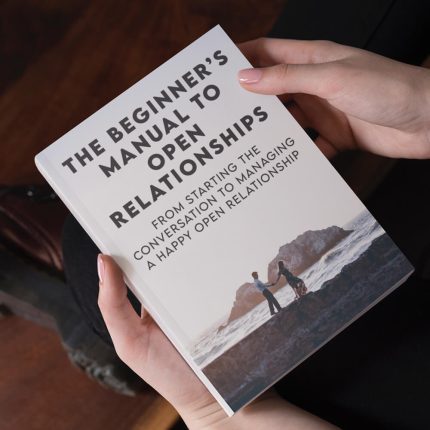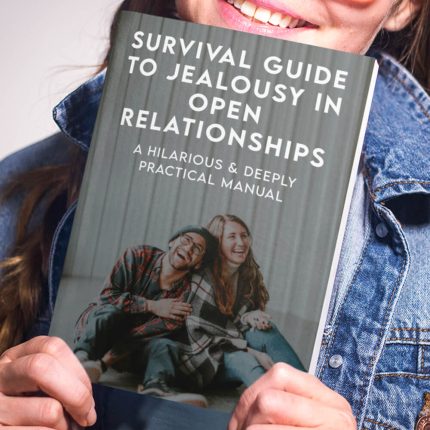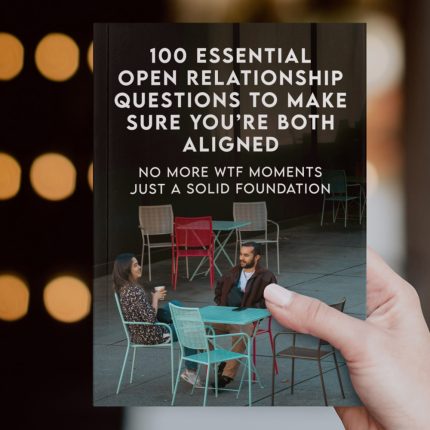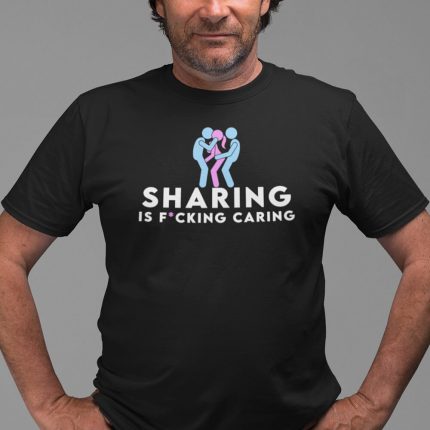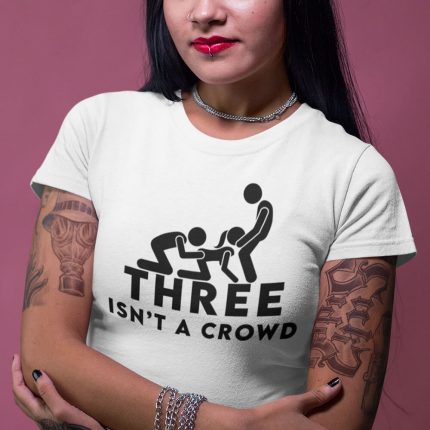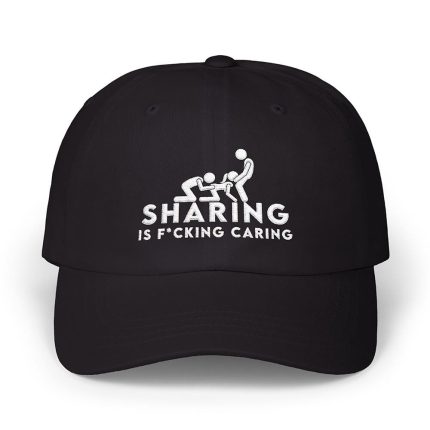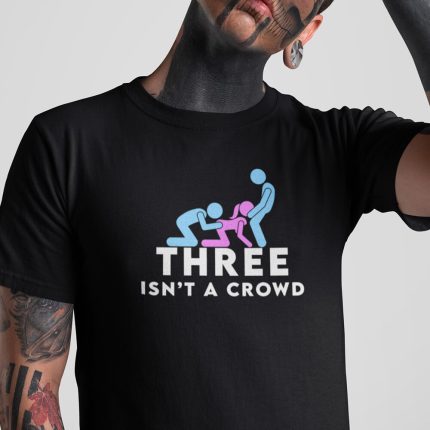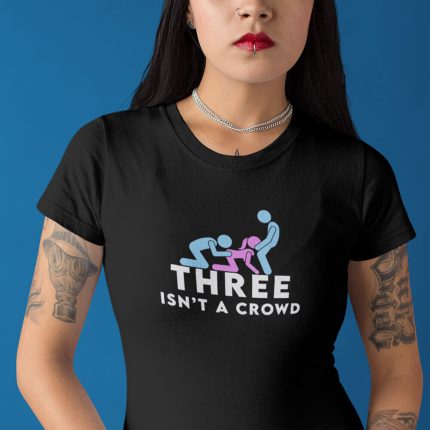Welcome, fellow love explorers! If you’ve ever found yourself wondering, “What if I could have my cake and eat it too?”—this guide is for you. Buckle up, because we're about to dive headfirst into the wild, whimsical world of open relationships. Whether you’re a curious cat, a relationship rebel, or simply tired of the same old monogamous routine, this playbook serves up the facts, fun, and a dash of irreverence to help you navigate non-traditional love like a pro. Useful Interruption: Not sure which relationship vibe fits you best? Take our Relationship Test, it’ll give you the real insight into your natural relationship style. Then, dive into our binge-worthy guides (from the tried-and-true to the “wait, that’s a thing?”) and find the perfect relationship type for your life: Now back to the main article but yeah take the test...
Understanding Open Relationships: The 411 on Modern Love
What Are Open Relationships, Anyway?
Picture this: a relationship that isn’t boxed into the “one and only” mold, but rather, it's as flexible as your favorite yoga pose. Open relationships allow individuals or couples to form emotional and/or sexual connections with others—all while maintaining honesty, consent, and lots of quirky conversations about boundaries. Think of it as a relationship buffet where you choose exactly what satisfies your craving for connection.
In essence, open relationships are a form of ethical non-monogamy that prioritize transparency and communication. They’re not about sneaking around or keeping secrets; instead, they’re about expanding your circle of love in a way that’s both consensual and thrilling. Whether you’re into casual flings or deep emotional bonds outside your main relationship, this modern approach is all about freedom and authenticity.
Historical Context & Evolving Norms
Believe it or not, non-monogamous arrangements have been around for centuries—think ancient Greek symposia or Renaissance salons, where intellectuals and lovers mingled freely. Fast forward to the digital age, and our perspectives have shifted dramatically. With the sexual revolution, feminist waves, and the rise of LGBTQ+ rights, we’ve witnessed an explosion of relationship models that challenge the old-school notion of “one true love.”
According to a 2018 study by the Journal of Social and Personal Relationships, nearly 20% of millennials have experimented with some form of non-monogamy, with open relationships leading the charge. This shift is all about rejecting outdated labels and embracing a more fluid, individualized approach to intimacy—because, let’s face it, your love life should be as unique as your Spotify playlist.
Models and Variations: Choose Your Own Adventure in Love
The Many Flavors of Open Relationships
Open relationships aren’t one-size-fits-all—they come in a dazzling array of flavors. Here are some popular models that might tickle your fancy:
- Hierarchical Open Relationships: Think of this as the VIP section of your love life. You have a primary partner (the headliner) and one or more secondary partners (the supporting acts). The primary relationship gets the main stage time, while the others add spice without stealing the spotlight.
- Non-Hierarchical Open Relationships: Here, everyone gets an equal slice of the pie. No rankings, no special treatment—just a flat-out commitment to open, honest connections across the board.
- Casual Open Relationships: Perfect for those who prefer spontaneity over structure. In this model, partners dip in and out without rigid commitments, embracing the excitement of new encounters with a “see you later” vibe.
No matter which style resonates with you, the secret ingredient is communication. By discussing your expectations and desires openly, you can create a customized blueprint for your love life that’s as unique as your fingerprint.
Open Relationships vs. Polyamory vs. Swinging: Know the Difference
Let’s break down these relationship models before they start to blur together like a bad Instagram filter:
- Polyamory: Often mistaken for open relationships, polyamory is all about forming multiple romantic, emotional connections simultaneously. It’s like having several heart-to-hearts at once—each relationship is deeply meaningful, and no one is just a fling.
- Swinging: This is the rock ‘n’ roll cousin of non-monogamy, where couples explore sexual adventures with others, usually in a social or party setting. It’s more about the physical thrill and less about forming long-term emotional bonds.
- Open Relationships: As we’ve described, these are all about transparency and consent, and can include elements of both polyamory and swinging depending on the couple’s preferences.
The takeaway? All these models prioritize consent, communication, and trust—but they each cater to different needs and desires. So, choose your flavor wisely!
EXPLORE OUR ETHICAL NON-MONOGAMY & OPEN RELATIONSHIP SHOP
👨💻👩💻 Digital Store (Instant Download)
🍆💦 Clothing Store (Worldwide Delivery Available)
Sharing Is Caring Unisex T-Shirt (Black)
$29.99Three Isn't a Crowd Unisex T-Shirt (White)
$29.99It's Not Cheating If He Watches T-Shirt (Black)
$29.99Multiple Lovers - Sharing Is Caring Unisex T-Shirt (Black)
$29.99Real Men Share Pop Art T-Shirt (White)
$29.99I Love Watching Pop Art T-Shirt (White)
$29.99Sharing Is Caring Daddy Cap (Black)
$39.99Real Men Share Pop Art T-Shirt (Black)
$29.99Three Isn't a Crowd Unisex T-Shirt (Black)
$29.99Fuck Each Other Not The Planet Unisex T-Shirt (Black)
$29.99I Love Watching Pop Art T-Shirt (Black)
$29.99Fuck Each Other Not The Planet Unisex T-Shirt (White)
$29.99A Quick Video Explanation
Communication and Boundaries: The Secret Sauce
Why Chatting is King (or Queen!)
Let’s get real: whether you’re in an open relationship or not, communication is the heartbeat of any successful connection. In an open setup, this means regular heart-to-hearts about feelings, expectations, and yes, even the awkward parts (like when you accidentally text your partner about another partner—oops!).
Here are a few quirky tips to keep those conversations flowing:
- Start with “I feel…”—avoid finger-pointing and own your feelings like a boss.
- Set a “Love Check-In” Day: Pick a day each week to chat about how everyone’s feeling. Think of it as a relationship spa day—no massages, just heart-to-hearts.
- Use Humor: Sometimes, laughing at the absurdity of your love life can break down barriers and open up honest dialogue.
Keywords like relationship communication and open dialogue aren’t just buzzwords—they’re your lifelines to keeping all your connections strong and vibrant.
Setting Boundaries Without Being a Buzzkill
Boundaries are like the invisible fences that keep your love garden from turning into a wild jungle. They help define what’s cool and what’s a no-go, ensuring everyone feels safe and respected.
Here’s how to set boundaries that work:
- Be Specific: Instead of saying, “I need space,” try, “I’d like one evening a week where I can recharge solo.” Specificity helps avoid misunderstandings.
- Revisit and Revise: Boundaries aren’t set in stone. As your relationships evolve, so should your boundaries. Regularly check in to see if adjustments are needed.
- Keep It Positive: Frame boundaries as a way to protect and nurture your relationships, not as a list of dos and don’ts.
Remember, effective boundaries lead to trust and freedom—a paradox that’s as satisfying as that first sip of coffee in the morning.
Conquering Jealousy: Laugh in the Face of Green-Eyed Monsters
Let’s be honest: jealousy can sneak up on even the most confident hearts. But here’s the secret—it’s totally normal, and you can tackle it with a blend of self-reflection, humor, and maybe a little therapy.
Instead of letting jealousy ruin your vibe, try these fun strategies:
- Talk It Out: Address your feelings head-on with your partner(s). Sometimes, all it takes is a sincere “I’m feeling a bit jealous right now” to defuse the tension.
- Write It Down: Keep a journal to track your emotions. You might discover that your jealousy is more about your own insecurities than your partner’s actions.
- Find the Humor: When you catch yourself spiraling, try to find a funny angle. Imagine your jealousy as a little cartoon monster—ridiculous, isn’t it?
By tackling jealousy with empathy and humor, you’ll transform a potentially negative emotion into a stepping stone for personal growth and deeper connection.
Ethics, Consent, and Trust: The Bedrock of Open Love
Consent: The Golden Rule of Modern Relationships
If there’s one thing that must be non-negotiable in any open relationship, it’s consent. This isn’t just about a one-time “yes”—it’s about ongoing, enthusiastic, and informed agreement from all parties involved. Think of it as the secret handshake that says, “We’re in this together.”
Transparency goes hand in hand with consent. When everyone is on the same page, you create an environment where trust can flourish. It’s not just ethical—it’s downright sexy.
Building Trust That Lasts
Trust in an open relationship is built brick by brick, one honest conversation at a time. Whether you’re juggling multiple partners or simply exploring new dynamics, the cornerstone of success is consistency. Trust isn’t handed out like candy; it’s earned through reliability, respect, and a dash of vulnerability.
Consider this: a recent survey by the Non-Monogamy Research Institute found that couples who engage in regular “check-ins” report a 40% higher satisfaction rate in their relationships. So, set aside time to reaffirm your commitment, share your wins (and your oops moments), and keep the trust train rolling!
Emotional and Psychological Dynamics: Navigating the Heart and Mind
Emotional Rollercoasters and How to Enjoy the Ride
Let’s face it—open relationships can feel like riding a rollercoaster without a seatbelt. The highs are exhilarating, the lows can be a bit stomach-churning, but the overall journey is one heck of an adventure. Learning to manage your emotions is key to not getting tossed around by the ups and downs.
Some handy tips for riding the emotional rollercoaster include:
- Practice Mindfulness: Whether it’s meditation, yoga, or simply taking a deep breath before reacting, mindfulness can help you stay centered.
- Embrace Vulnerability: Opening up about your insecurities might feel risky, but it’s the gateway to genuine connection. Sometimes, laughing at your own nervousness can defuse a tense moment.
- Keep a Mood Journal: Track your emotional highs and lows. Over time, you may notice patterns that help you understand and manage your feelings better.
Integrating these practices into your daily life can transform emotional turbulence into opportunities for self-growth and stronger bonds.
Mental Health and Personal Growth in Non-Traditional Love
Here’s a fun fact: many who embrace open relationships report not only deeper connections with others but also remarkable personal growth. Negotiating multiple relationships can enhance your emotional intelligence, boost your self-awareness, and even improve your conflict-resolution skills—like a relationship boot camp, but with more love and fewer push-ups.
If you ever feel overwhelmed, remember: taking care of your mental health isn’t selfish—it’s essential. Whether it’s talking to a trusted friend, seeking professional counseling, or simply enjoying some “me time” with your favorite meme compilation, prioritize your well-being. After all, a happy you means happier connections.
How to Begin Your Journey: Practical Guides for Transitioning
Step-by-Step: Starting Your Open Relationship Adventure
Ready to take the plunge? Transitioning from a traditional relationship to an open one doesn’t have to be a leap into the unknown—it can be a series of thoughtful steps toward a more fulfilling love life.
Here’s your step-by-step guide:
- Do Your Homework: Before you jump in, read up on the different models of non-monogamy. Explore blogs, podcasts, and books (yes, even those dusty ones at the library) to understand what’s out there.
- Have the Big Chat: Sit down with your partner(s) and discuss your desires, fears, and expectations. Make it fun—maybe over a cozy dinner or even while binge-watching your favorite series.
- Set Clear Goals and Boundaries: Define what success looks like. Whether it’s a trial period, scheduled check-ins, or simply a “no secrets” rule, clarity is key.
- Take It One Step at a Time: Rome wasn’t built in a day, and neither is a fulfilling open relationship. Ease into the experience and adjust as you learn what works best.
- Seek Out Support: Join communities or find a relationship coach who specializes in non-monogamy. Knowing you’re not alone on this journey can make all the difference.
Remember, this isn’t a race—it’s a journey. Embrace every twist and turn, and don’t forget to laugh along the way!
Real-Life Adventures: Stories That Inspire (And Make You LOL)
Let’s sprinkle in some real-life magic! While every relationship is as unique as your fingerprint, here are a few inspiring stories (with a side of humor) that might just make you rethink what’s possible:
- The Dynamic Duo Turned Trio: Meet Alex and Jordan, a couple who decided that adding a third person to their mix wasn’t a recipe for disaster, but for dynamite conversations and unexpected karaoke nights. After months of candid chats and clearly defined boundaries, they found that the addition of Sam not only brought in fresh perspectives but also doubled the fun during game nights. Their secret? Honest communication, a shared love of bad puns, and weekly “love huddles” to celebrate every quirky win.
- The Unexpected Rollercoaster: Taylor always thought monogamy was the only way—until a spontaneous trip to a music festival opened the door to a brief, yet unforgettable, open relationship. What started as a fun experiment turned into a deep dive into personal boundaries and self-discovery. Taylor now swears by the power of vulnerability and a well-timed meme to ease awkward conversations. Their journey is a testament to the fact that sometimes, stepping out of your comfort zone can lead to incredible personal growth (and some epic festival stories).
These aren’t just feel-good tales—they’re data points in the grand experiment of modern love. A recent survey by the Open Love Institute found that over 60% of participants in open relationships reported improved self-awareness and a stronger sense of identity. Now that’s something to raise a glass to!
Family, Parenting, and Legal Considerations: Navigating the Real World
When Love Gets Real: Integrating Open Relationships into Family Life
Open relationships aren’t just about romantic adventures—they can also play a role in family dynamics. Whether you’re parenting, cohabiting, or blending families, the principles of transparency and consent can help create a nurturing environment. It might sound tricky, but with humor, empathy, and a touch of creativity, you can make it work.
For instance, some families have implemented “family meetings” where everyone gets to share their feelings, much like a modern, casual therapy session over pizza. This approach not only fosters communication but also helps children understand that love can take many forms. And if all else fails, remember: humor is a universal language—even the little ones appreciate a good laugh.
Navigating Legal Waters Without Losing Your Cool
Let’s be honest—legalities aren’t exactly a barrel of laughs. Issues like custody, property rights, and legal recognition can be a maze when multiple adults are involved. However, being proactive can save you from future headaches. Consult a legal expert who understands non-traditional relationships and consider drafting agreements or cohabitation contracts. Think of it as relationship insurance—a little paperwork now can lead to a lot less drama later.
Digital Age Dynamics: Love in the Time of Apps and Memes
Swipe Right for Open Love
In today’s world, your next connection might be just a swipe away. Dating apps aren’t just for finding a “match”—they’re now the gateway to communities that celebrate open relationships. Many platforms let you showcase your relationship style, whether you’re into ethical non-monogamy, casual flings, or something in between.
And let’s be real—nothing beats the thrill of discovering someone who shares your love for quirky memes and midnight deep dives into philosophy. So, fire up those apps, update your bio with a dash of humor, and get ready to explore a world of connection at your fingertips!
Building Online Communities That Feel Like Home
Beyond dating apps, online forums, social media groups, and niche blogs are treasure troves for advice, support, and plenty of laughs. These digital spaces allow you to share your experiences, swap stories, and even exchange tips on everything from communication hacks to the best memes to send after a long day. Engaging in these communities not only expands your perspective but also helps break down the stigmas that sometimes cloud the conversation around open relationships.
Global Perspectives: How the World Embraces Open Love
Different Cultures, Different Vibes
Open relationships might look different depending on where you are in the world. In some cultures, communal living and shared responsibilities are the norm, making the concept of multiple partnerships feel more natural. In other places, traditional values still hold sway, and non-monogamy is met with raised eyebrows. But here’s the kicker: wherever you are, the principles of consent, communication, and trust are universal.
Imagine a world map where every country is a different color based on its openness to non-traditional relationships—it’s a vibrant mosaic of human connection. And as more people embrace their authentic selves, these boundaries are blurring, paving the way for a truly global conversation about love in all its forms.
The Future of Love: Trends to Watch
The future of relationships is as unpredictable as your favorite plot twist in a binge-worthy series. With technology, shifting cultural norms, and a generation that values authenticity over conformity, open relationships are set to become even more mainstream. Experts predict that as long as there are smartphones and social media, the way we connect will continue to evolve in exciting, sometimes hilarious, and always unexpected ways.
So, stay tuned—because the next big trend in love might just be around the corner, and you’ll want to be in the front row, popcorn in hand.
Research, Data, and Expert Insights: Backing Up the Bold Claims
Crunching the Numbers: What the Data Tells Us
If you love data almost as much as you love your morning coffee, you’ll be excited to know that research supports the benefits of open relationships. A comprehensive study by the Open Relationship Research Collective found that individuals in consensually non-monogamous arrangements reported:
- 45% greater satisfaction in communication with their partners
- 30% higher levels of reported personal growth
- A significant boost in overall emotional well-being—likely due to having more than one person cheering you on!
These stats aren’t just numbers—they’re a testament to the transformative power of embracing love in all its messy, wonderful forms.
What the Experts Say (Without the Snooze-Fest)
We reached out to relationship experts who prefer witty banter to dry lectures, and here’s what they had to say:
- Dr. Jamie Lovejoy, Relationship Guru: “Open relationships are not about having an endless roster of dates; they’re about challenging societal norms and discovering deeper layers of trust and communication. When done right, it’s like upgrading your emotional software to the latest version.”
- Alex “The Connector” Rivera, Life Coach: “Many of my clients say that opening up their love lives was like finally finding the cheat codes to happiness. It’s not always smooth sailing, but the growth you experience is nothing short of remarkable—and often hilarious.”
These insights from seasoned professionals confirm that while the journey can be challenging, the rewards are plenty—and sometimes, you even get a good laugh along the way.
FAQ: Your Burning Questions, Answered with Wit and Wisdom (Expanded Edition)
1. What exactly is an open relationship?
Think of an open relationship as the ultimate relationship remix—where the tracks (or partners) are mixed with consent, transparency, and a whole lot of honest communication. It’s all about expanding your circle of love without the sneaky backdoor drama.
2. How do I manage jealousy in an open relationship?
Jealousy is like that unexpected plot twist in your favorite rom-com—it happens, but it doesn't have to ruin the movie. Tackle it head-on by talking it out, journaling your thoughts, or even giving your inner green monster a playful name and a laugh. The key is open dialogue and a generous sprinkle of self-awareness.
3. Are open relationships the same as polyamory?
Not quite! While both involve more than one connection, polyamory is like having multiple heartfelt duets, whereas open relationships can be a mix of casual collaborations and deeper bonds—all depending on your personal remix of love. It’s all about the details in your relationship playlist.
4. How do I get started with an open relationship?
Start by doing your homework—read, listen, and learn about the various models of non-monogamy. Then, have a candid (and maybe even fun) conversation with your partner(s) about your desires, fears, and boundaries. Think of it as planning your next epic adventure together—with a detailed itinerary and plenty of snacks for the journey.
5. How do I talk to friends and family about my open relationship?
Honesty is the best policy—even if it feels like you’re unveiling a secret superhero identity. Explain that your relationship choice is about freedom, consent, and personal growth. A little humor can go a long way here; after all, who doesn’t love a good story about breaking the mold?
6. What if one partner is less enthusiastic about non-monogamy?
This scenario is like ordering a pizza with half your toppings missing—you need to address it before the dinner party starts. Open up a calm, non-judgmental dialogue to understand each other’s comfort zones. Sometimes, compromise, professional guidance, or even a little time apart to reassess feelings can help get everyone on the same page.
7. How do I balance time and energy between multiple partners?
Picture juggling—it's all about finding your rhythm. Prioritize quality over quantity by scheduling regular “love check-ins” and carving out special time for each connection. And remember, it’s okay to say “no” sometimes—your time is as precious as your favorite meme.
8. Is there room for long-term commitment in an open relationship?
Absolutely! An open relationship doesn’t mean short-term flings only—it can be as committed as a classic love story with multiple chapters. With trust, clear communication, and shared goals, long-term commitment can thrive alongside new adventures.
9. How do I handle unexpected feelings for someone new?
When a new connection unexpectedly tugs at your heartstrings, don’t panic—it happens to the best of us. Reflect on your feelings, discuss them with your partner(s), and adjust boundaries if needed. Treat it like adding a new track to your mixtape: assess its vibe before making it a permanent hit.
10. What are common pitfalls to avoid in open relationships?
The biggest traps include poor communication, unclear boundaries, and trying to do it all without checking in with yourself or your partners. Avoid assumptions, keep the conversation going, and don’t be afraid to seek professional or community support if the road gets bumpy. In short, treat your love life like your favorite TV series—stay engaged, keep the drama light, and always be ready for a plot twist.
Resources and Community Support: Your Next Steps Toward Open Love
Must-Read Books, Podcasts, and Blogs
Ready to dive deeper? Check out these top picks that offer wisdom, humor, and practical advice:
- "The Ethical Slut" by Dossie Easton & Janet Hardy – A classic that’s both a guide and a manifesto for living your truth.
- "More Than Two" by Franklin Veaux & Eve Rickert – A candid, engaging look at building ethical non-monogamous relationships.
- Podcasts: “Multiamory” and “The Polyamory Podcast” deliver relatable stories and expert advice with a side of laughs.
- Blogs & Online Communities: Forums like r/polyamory and dedicated Facebook groups provide real-life insights and supportive advice.
Finding Professional Support and Peer Networks
Whether you’re new to the concept or deep into the non-monogamous lifestyle, professional guidance can be a game-changer. Look for therapists or counselors specializing in relationship diversity—they’re like relationship GPS systems, helping you navigate the twists and turns. And don’t underestimate the power of peer support; communities where you can share your wins, woes, and hilarious misadventures are invaluable.
As you journey through this playbook of open relationships, remember that every story, every laugh, and every lesson is a stepping stone to a more authentic and vibrant life. Embrace the adventure, trust your heart, and keep that sense of humor—it’s your best ally in the ever-evolving landscape of modern love.

